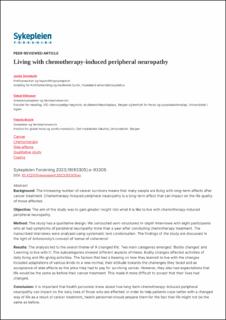| dc.contributor.author | Svindseth, Janita | |
| dc.contributor.author | Ellingsen, Sidsel | |
| dc.contributor.author | Bruvik, Frøydis Kristine | |
| dc.date.accessioned | 2024-01-10T12:17:57Z | |
| dc.date.available | 2024-01-10T12:17:57Z | |
| dc.date.created | 2023-11-12T11:47:29Z | |
| dc.date.issued | 2023 | |
| dc.identifier.citation | Sykepleien Forskning. 2023, 18, e-93305, | en_US |
| dc.identifier.issn | 1890-2936 | |
| dc.identifier.uri | https://hdl.handle.net/11250/3110853 | |
| dc.description | Attribution 4.0 International (CC BY 4.0) | en_US |
| dc.description.abstract | Background: The increasing number of cancer survivors means that many people are living with long-term effects after cancer treatment. Chemotherapy-induced peripheral neuropathy is a long-term effect that can impact on the life quality of those affected.
Objective: The aim of the study was to gain greater insight into what it is like to live with chemotherapy-induced peripheral neuropathy.
Method: The study has a qualitative design. We conducted semi-structured in-depth interviews with eight participants who all had symptoms of peripheral neuropathy more than a year after concluding chemotherapy treatment. The transcribed interviews were analysed using systematic text condensation. The findings of the study are discussed in the light of Antonovsky’s concept of ‘sense of coherence’.
Results: The analysis led to the overall theme of ‘A changed life’. Two main categories emerged: ‘Bodily changes’ and ‘Learning to live with it’. The subcategories showed different aspects of these. Bodily changes affected activities of daily living and life-giving activities. The factors that had a bearing on how they learned to live with the changes included adaptations of various kinds to a new normal, their attitude towards the challenges they faced and an acceptance of side effects as the price they had to pay for surviving cancer. However, they also had expectations that life would be the same as before their cancer treatment. This made it more difficult to accept that their lives had changed.
Conclusion: It is important that health personnel know about how long-term chemotherapy-induced peripheral neuropathy can impact on the daily lives of those who are affected. In order to help patients cope better with a changed way of life as a result of cancer treatment, health personnel should prepare them for the fact that life might not be the same as before. | en_US |
| dc.language.iso | eng | en_US |
| dc.publisher | Norsk Sykepleierforbund | en_US |
| dc.rights | Navngivelse 4.0 Internasjonal | * |
| dc.rights.uri | http://creativecommons.org/licenses/by/4.0/deed.no | * |
| dc.subject | coping | en_US |
| dc.subject | qualitative study | en_US |
| dc.subject | side effects | en_US |
| dc.subject | chemotherapy | en_US |
| dc.subject | cancer | en_US |
| dc.title | Living with chemotherapy-induced peripheral neuropathy | en_US |
| dc.type | Peer reviewed | en_US |
| dc.type | Journal article | en_US |
| dc.description.version | publishedVersion | en_US |
| dc.source.pagenumber | 1-12 | en_US |
| dc.source.volume | 18 | en_US |
| dc.source.journal | Sykepleien Forskning | en_US |
| dc.identifier.doi | 10.4220/Sykepleienf.2023.93305en | |
| dc.identifier.cristin | 2195387 | |
| cristin.ispublished | true | |
| cristin.fulltext | original | |
| cristin.qualitycode | 1 | |

